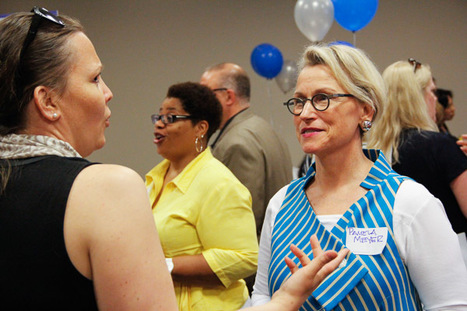
Ana Widmer and Pamela Meyer engaged in conversation.
By Mary Hauser
ATDChi Student Ambassador
ATDChi’s Learning and Networking event and DePaul’s School for New Learning Graduates’ showcase on June 13 was a great opportunity for someone new to the field of Talent Development to learn more about the field from student projects and from experienced professionals in the Chicago area.
The evening started off with refreshments, as we were invited to engage with and view three graduating MAEA (Master of Arts in Educating Adults) students’ applied inquiry projects. The projects centered on topics such as the neuroscience of learning, applied adult learning theories, and disability training. Projects were based on applied research conducted by the students in their own work environments in conjunction with classes they were taking. It was enlightening to see how what is learned in the classroom can be directly applied in “real life”, especially learning theories, which can be quite abstract until put into practice. With each project, one could see how the students’ knowledge developed as they put research into practice – directly and immediately impacting their respective work environments.
A very informative panel discussion followed the student presentations. Panelists included: Sarah Vetter, Education Coordinator, Division of Rehabilitative Services with Ann & Robert H. Lurie Children’s Hospital of Chicago; Barbara Lewis, HR Manager at John Wiley & Sons; Marcus Potter, Senior Training Consultant, Curriculum Design with CVS Caremark; and Gloria Batey, Practice Area Director, Organizational Change Management/Training with the William Everett Group and Community Learning Leader. Below are some key takeaways from the discussion:
- Our learners impact the next generation of learners: What and how we train our learners affects how they train their learners. If we do a good job of training the trainer, the quality of their training will be of high quality, too, which translates into overall better results.
- Traditional learning is not working: learning practitioners are moving away from content-focused to learner-focused sessions, where they see the most transfer and retention of knowledge. Practitioners are also moving away from PowerPoint type training.
- It’s essential to get out of one’s comfort zone and be open to what is new, and what works.
- In this day and age, many courses already are in existence, and there is no need to recreate the wheel. Instead of asking “What can I create?” instead ask “What can I make better?”
- Knowledge manager roles are becoming more popular.
The discussion then turned to innovations important to the TD field. According to the panelists, they’re seeing new innovation happening around the following topics:
- Curation
- Neuroscience
- Mindfulness of the company’s expectation of your role: Always be aware of what is expected of your performance and outcomes of your work from your boss, coworkers and your teammates and work to meet those expectations.
- Time & Distance learning: Online learning can be dynamic and innovative when thought and good design go into it.
- Proving ROI to a company and stakeholders.
- Success Case Model: having the ability to see the overall business impact.
The last part of the event included networking with other students, program faculty, professionals and recruiters from local organizations. I was able to learn more about what skills recruiters are seeking in new graduates, what skills I might need to work on to make myself more marketable, and what types of organizations I might be interested in working with in the future.
I walked away inspired to learn and do more, and I look forward to future ATDChi learning and networking events.




 Your new post is loading...
Your new post is loading...






